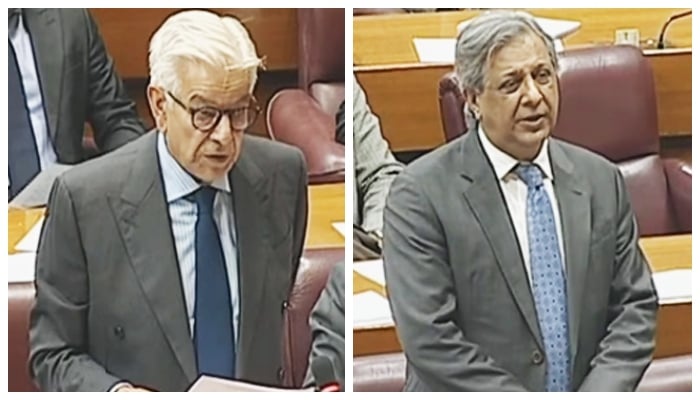ISLAMABAD: The National Assembly on Thursday endorsed changes to the Army, Navy, and Air Force Acts, shortly after the federal cabinet gave a nod to the proposed amendments.
Earlier, the cabinet approved the changes, following the approval of the 27th Constitutional Amendment by President Asif Ali Zardari.
The purpose of the amendments is to align the armed forces laws with the 27th Amendment, read a statement issued by the Prime Minister’s Office.
The legislation has been enacted following amendments to Article 243 of the Constitution, which includes provisions regarding the tenure of the Chief of Defence Forces, it added.
Defence Minister Khawaja Asif presented the bills concerning the armed forces.
COAS to become CDF; CJCSC post ceased
Speaking on the floor of the house, Law Minister Azam Nazeer Tarar clarified that the changes were not new laws, but amendments to existing legislation.
“The change in the Army Act is that the current Chief of Army Staff will concurrently be the Chief of Defence Forces [CDF], and the Chairman Joint Chiefs of Staff Committee’s (CJCSC) position will cease to exist once the incumbent general retires,” he said.
The law minister said that the CDF’s term would be five years from the date of his appointment.
He added that certain provisions have been removed from the Navy and Air Force Acts, while others have been introduced.
The amendments to Article 243 introduced, in addition to the CDF post, honorary titles such as Field Marshal, Marshal of the Air Force, and Admiral of the Fleet.
Only the parliament would have the power to reverse the titles of the armed forces’ chiefs and to impeach them.
Additionally, the prime minister would appoint the National Strategic Command’s commander from the Army on the CDF’s recommendation.
Supreme Court Practice, Procedure Bill, 2025
In today’s NA session, Law Minister Tarar introduced the Supreme Court Practice and Procedure (Amendment) Bill 2025, paving the way for the cessation of the Constitutional Benches. The bill was passed by the lower house with a majority.
The law minister said the amendments were aimed at aligning the laws governing the judiciary with the 27th Amendment.
The prime minister will now send a summary for the appointment of the Chief Justice of the Federal Constitutional Court, he added.
Under the tweaks, the government removed Clause 191-A related to the top court’s practice and procedure.
Under the new law, the authority to constitute benches for hearing cases has been vested in a three-member committee headed by the chief justice.
The committee will comprise the chief justice of the Supreme Court, the most senior judge, and a third judge nominated by the country’s top jurist.
In the absence of any member, the chief justice may nominate another judge to serve on the committee.
Decisions regarding the formation of benches by the committee will be made by a majority vote.

